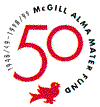
Fifty years ago, post-war McGill was running at a deficit. Tuition fees had recently been raised, but still only covered about one-third of the total cost of educating the University's students, whose numbers had swelled by over 150% to 8,200 as young veterans resumed their studies. In the McGill News of Autumn 1948, wealthy industrialist and businessman E.P. Taylor, BSc'22, who with fellow graduates created the Alma Mater Fund, captured the sense of urgency as he described the need for this new "living endowment."
"At the present time," wrote Taylor, "the University is simply not making ends meet.... The basic and continuing cause is today's generally higher level of costs."
Taylor noted that while tuition fees had been raised, "None of us wants to see them go still higher. Of course, they still don't come close to paying the cost of the student's education.... It was the same in your day. The major share of our McGill education was paid for by the contributions of others. Now we have the opportunity of giving similar help to the students of today -- and tomorrow."
Earlier that summer, Taylor and other volunteers managed to visit 30 of the 41 branches of the Graduates' Society in Canada and the U.S. to explain the new annual giving program to branch executives. They were able to spread the word so far and so fast thanks to Taylor's favorite mode of travel. "He uses a Gruman Mallard amphibious plane to drop down when and where the graduates please," wrote Fund secretary F. Lyle Pattee.
In those early years, it was not unusual to find mention of annual campaign kick-off events, phonathons and cheque presentations in the pages of the Gazette and the Montreal Star. The Fund took root and grew through periods in which McGill faced financial crises, capital expansion, student activism and political turmoil. When Principal F. Cyril James addressed an Alma Mater Fund dinner in 1962, he outlined a major development plan for the University, including new buildings, which would double the size of the campus (whose size would double again by the early 1970s), and an increase in enrolment, which by 1970 would reach almost 17,000. Given the salary, equipment and research needs that the expansion entailed, James told graduates, "I would like to hope that the Fund will continue to grow as a vital -- the vital -- factor in accelerating McGill's development."
 Still, the questions E.P. Taylor raised 50 years ago are all too familiar for those running a university today: how can one ensure the university's academic salaries are competitive? What additional public funding can be found? All the fat has been trimmed -- how can one make deeper cuts without jeopardizing the quality of a university education? McGill's current operating deficit stands at around $3 million (with total operating revenue for 1997-98 at just over $472 million), its accumulated deficit stands at just under $58 million, while the provincial government continues to cut funding and refuses to allow tuition increases. Still, the questions E.P. Taylor raised 50 years ago are all too familiar for those running a university today: how can one ensure the university's academic salaries are competitive? What additional public funding can be found? All the fat has been trimmed -- how can one make deeper cuts without jeopardizing the quality of a university education? McGill's current operating deficit stands at around $3 million (with total operating revenue for 1997-98 at just over $472 million), its accumulated deficit stands at just under $58 million, while the provincial government continues to cut funding and refuses to allow tuition increases.
As its 50th anniversary is celebrated, the Alma Mater Fund will continue to help ensure that McGill offers a quality education. This year, the Fund welcomes a new chair, Marie Giguère, BCL'75, who takes over from Barrie Birks, BA'70. Giguère is Executive Vice-President, Corporate Affairs at the Montreal Exchange and comes highly recommended for her work on the McGill Board of Governors, as well as her fundraising efforts on behalf of the Faculty of Law. While she is the first woman and first francophone chair of the Fund, she doesn't see that as a big deal. "I hadn't noticed," she says, "although I hope I will not be the last in either category."
Taking time to help McGill while one already has a demanding job is not unusual -- volunteers have always been the strength of the Alma Mater Fund. Giguère is happy to get involved because of "McGill's efforts in promoting a sense of belonging and its commitment to diversity, as well as my belief that universities are crucial to Montreal's development."
As for the motivations of those who donate their money, outgoing chair Barrie Birks echoes E.P. Taylor's words: "McGill graduates benefited from an education that they realize was supported by something other than just their fees, and they want to help others benefit from that same experience. There's a personal advantage to it as well. Your degree is only as good as your institution is today, and its reputation can only be helped by private support."
In its first year, the Fund set a record for all universities in North America with total contributions of $132,230. Fifty years later, the amount raised was $4.49 million, providing support for scholarships, libraries, athletic facilities and faculty development projects. It paid for the $69,000 van for disabled students, and the purchase of 20 computers for the Career Centre, "so students can come in, do their CVs, and do job searches online," says Birks.
The primary goal of the Fund remains unchanged from 1948: to enlist graduate support for immediate, day-to-day needs. In the mid-'70s, then Principal R.E. Bell summed up the Alma Mater Fund with these still appropriate words: "Government support is the basic source of our strength. Private support is the real source of our distinction."
Jennifer Towell is an Annual Fund Officer for Development and Alumni Relations.
|